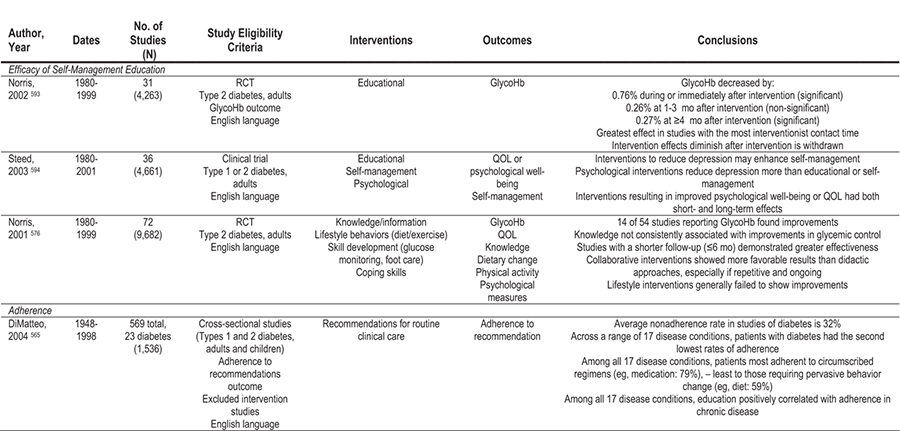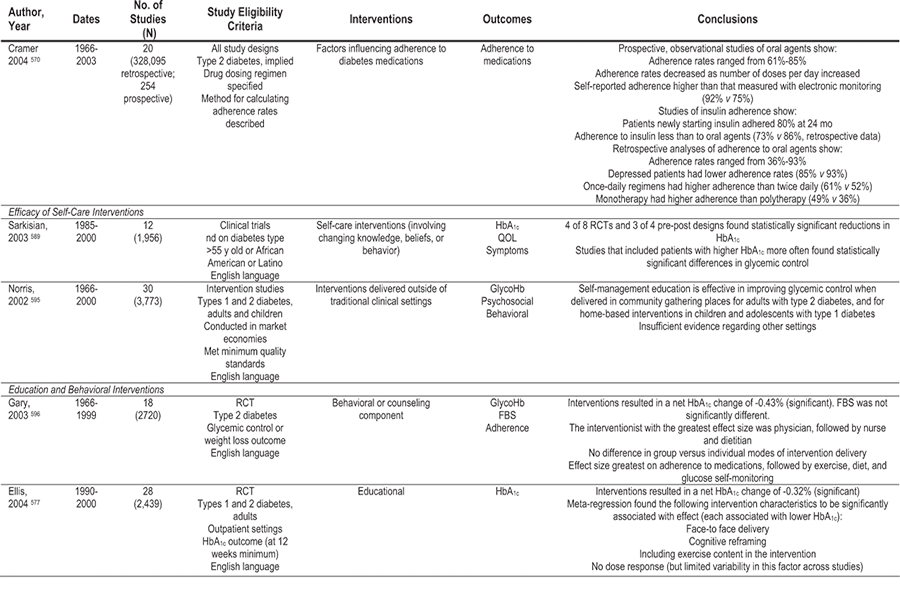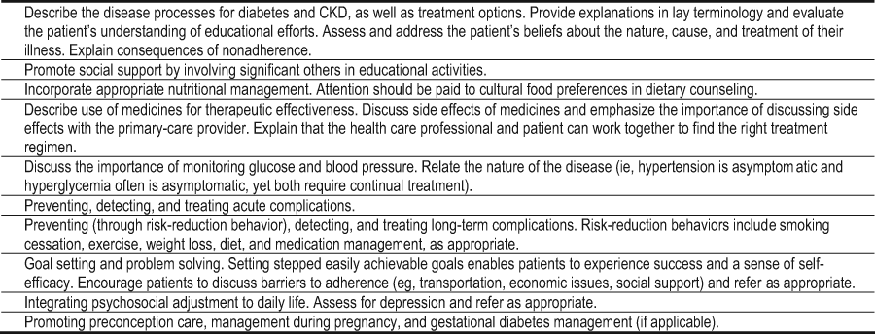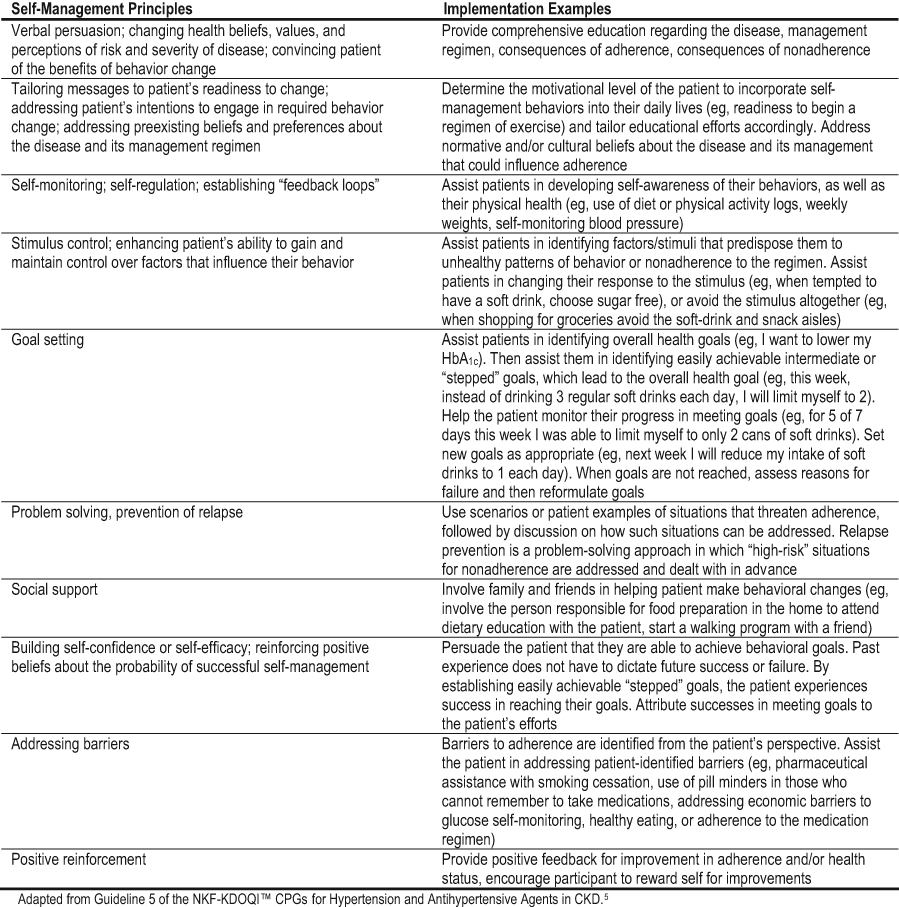


Behavioral self-management in diabetes and CKD is particularly challenging because of the intensive nature of the diabetes regimen. Education alone is not sufficient to promote and sustain healthy behavior change, particularly with such a complex regimen.
4.1 Self-management strategies should be key components of a multifaceted treatment plan with attention to multiple behaviors: (C)
- Monitoring and treatment of glycemia,
- Blood pressure,
- Nutrition,
- Smoking cessation,
- Exercise, and
- Adherence to medicines.
The success of strategies to promote glycemic control and minimize progression of CKD depends upon patient self-management, or the ability and willingness of the patient to change and subsequently maintain appropriate behaviors regarding diet, physical activity, medicines, self-monitoring, and medical follow-up visits. Adherence to complex regimens often is poor. Interventions to enhance adherence require intensive education and behavioral counseling. Maintenance of adherence requires ongoing support from a variety of health care professionals.
Due to complexity of the behavioral self-management regimen for diabetes and CKD and high frequency of nonadherence, alternative approaches to traditional education should be considered. (Moderate/Weak)
Self-management requires intensive education and behavioral adjustments in many areas, as well as taking a variety of medicines.561 Given the risks associated with diabetes and CKD, people with these conditions should engage in a rigorous self-monitoring regimen that typically includes blood glucose and blood pressure; examining skin integrity; obtaining regular foot, eye, medical, and dental examinations; and reporting complications to their health care providers. Glucose self-monitoring is particularly important for balancing physical activity and diet against medicines to control glycemia and prevent or impede the progression of complications.116,134,562-564 This regimen requires tremendous effort on the part of the patient. Efforts to adopt new behaviors may fail due to inadequate knowledge; lack of motivation; poor problem-solving skills; limited emotional, financial, and/or social resources; or a disease-management regimen that exceeds cognitive capacity. To our knowledge, no studies have specifically examined adherence of people with diabetes and CKD to self-management regimens. However, the challenges of modifying behavior to achieve adherence and successful self-management for those with diabetes are well established (Table 55).
A recent meta-analysis examining factors that influence adherence to disease management regimens found that patients have the least difficulty with circumscribed regimens (eg, medicines) and the most difficulty with regimens requiring extensive behavior change (eg, dietary change). Perhaps because of the extensive behavior change required of those with diabetes, patients with diabetes had among the lowest rates of adherence across a range of 17 disease states, second only to those with sleep disorders.565 A survey of 2,056 adults with diabetes from across the United States found the most frequently reported adherence problem was diet, followed by exercise and blood glucose monitoring.566
Dietary habits that develop over a lifetime can be particularly difficult to change. Individual perceptions of dietary restrictions, particularly feelings of deprivation, are difficult for patients and health care professionals to address. In addition to personal eating preferences, many foods have social, cultural, and/or religious meaning to patients, making feelings of loss even more significant. In addition, the dietary regimen for diabetes and CKD is complex. Ideal self-management requires vigilance regarding the content of meals and balancing nutritional intake with medicines and physical activity to achieve good glycemic control. Patients should be aware of day-to-day patterns in their blood glucose levels to make informed choices. However, a study found that patients typically purchase enough capillary blood sampling supplies to self-monitor their blood glucose for only 70% of possible days in the first 4 years after diagnosis and for only 50% of days thereafter.567 Moreover, at least 20% of patients with either type 1 or type 2 diabetes do not monitor their blood glucose at all.568, 569 Although glucose meters generally are inexpensive and easy to use, glucose testing strips are quite expensive, and some insurance companies provide little or no coverage for these supplies.
A recently completed systematic review of 20 studies conducted between 1966 and 2003 measured adherence to diabetes medicines (Table 55).570 The study found that, among patients using oral agents, adherence rates ranged from 36% to 93% and were even lower for insulin. Adherence also was found to be related inversely to the number of diabetes medicines prescribed. Thus, the addition of medicines for other common comorbid conditions (eg, hypertension and dyslipidemia) is likely to further reduce adherence. Rates of adherence to an exercise program ranged from 19% to 30% in people with diabetes,571, 572 indicating that compliance issues impact on multiple aspects of disease management. Another study found that only 7% of patients adhered to all aspects of their diabetes regimen.573



The management plan should include careful coordination of care, addressing both diabetes and CKD. (Moderate/Weak)
Although intensive glycemic control reduces diabetes complications,116, 134, 562, 564 once patients develop CKD, there may be a tendency to place less emphasis on glucose management. While no studies document inattention to glycemic control in early-stage CKD, a recent review of dialysis patient records found diabetes management to be suboptimal.574 Individuals with diabetes and CKD require the attention of a health care team that can address social, educational, emotional, and medical consequences of both conditions. The ADA has developed Standards for Diabetes Self-Management Education.575 These standards summarize evidence that self-management education is most effective when delivered by a multidisciplinary team. This team should include a combination of expertise in medical treatment, nutrition, teaching skills, and behavioral psychology. Each patient should have an individualized assessment, educational plan, and periodic reassessment pertaining to educational needs. Table 56 lists the components and principles of a diabetes and CKD self-management program, combining educational elements from the ADA Standards,575 Guideline 5 of the NKF-KDOQI™ CPGs for Hypertension and Antihypertensive Agents in CKD,5 and predictors of nonadherence.
Table 56. Components and Principles of a Diabetes and CKD Self-Management Education Program

Behavioral adherence should be assessed in all patients, particularly in those who do not respond to therapy. (Weak/Opinion)
Intensive glycemic control may increase the number of hypoglycemic episodes, with the need to increase food intake to cover peak times of insulin action. Although DCCT and UKPDS demonstrated that patients receiving intensive treatment had better glycemic control, they also were more likely to experience weight gain than those receiving usual care. Intensive treatment also may mask poor adherence to the treatment regimen, especially adherence to diet and physical activity. Over time, inattention to behavioral aspects of the regimen may mitigate the potential benefits of intensive treatment.
Self-management approaches based in behavioral medicine may be effective in enhancing adherence to the management regimen for diabetes and CKD. (Weak/Opinion)
No studies were found of interventions to enhance adherence of individuals to management regimens for diabetes and CKD. However, 2 meta-analyses have been published that provide valuable information about the most effective approaches for encouraging adherence to the diabetes regimen (Table 55). The first summarized the results of 72 studies conducted between 1980 and 1999. Interventions that were collaborative in nature (rather than didactic/lecture format) resulted in better glycemic control, particularly if the intervention contacts were repetitive and ongoing. Knowledge was not consistently related to glycemic control, and factors other than knowledge are needed to achieve long-term behavioral change.576 The second conducted a meta-regression analysis on 28 studies between 1990 and 2000 to characterize the components of behavioral interventions most likely to result in improved glycemic control. Face-to-face delivery (compared with telecommunication and written materials), cognitive reframing (involving goal setting and problem solving as opposed to didactic education), and interventions that included an exercise component were key to improving glycemic control.577 The principles noted in Table 57 enhance adherence to medical management in other patient populations and, in the opinion of the Work Group, should be applicable to patients with diabetes and CKD.
Complex regimens require multiple lifestyle changes. However, targeting multiple behaviors may have a negative impact on treatment.578 For example, in a study of hypertension treatments, participants who were instructed to follow a low-sodium diet and lose weight were less adherent than those who were instructed to follow either 1 of these regimens alone.579 Thus, targeting a single behavior or sequencing the introduction of various components of the diabetes and CKD management regimen may be required for successful self-management.
Table 57. Self-Management Principles

Assessments and educational efforts should take into consideration modifiable barriers to self-management, should be culturally appropriate, and should consider the unique learning needs of the patient. (Weak/Opinion)
Modifiable predictors of nonadherence to medical therapies in patients with hypertension include side effects of medicines, complexity of the regimen, cost and financial difficulties, depression, socioeconomic status, transportation issues, and social support.5 Modifiable predictors of nonadherence to the diabetes regimen include depression,580 self-efficacy (the patient's confidence in their ability to successfully manage their disease),581-584 and health literacy.585 In a study of exercise behavior of individuals with type 2 diabetes, nonexercisers were found to have more negative attitudes. They perceived physical discomfort, feared hypoglycemia, and had perceptions that they were too overweight. They also reported a lack of family support for engaging in exercise.586
Cultural factors also play a role in adherence. Ethnic minorities are overrepresented among people with diabetes.587 They also have a higher burden of diabetes and CKD than whites.499, 588 A recent review of studies targeting ethnic minorities with diabetes found that adherence was improved by tailoring the intervention to age or culture, use of group counseling or support, and involvement of significant others (Table 55).589
Cognitive deficits are common in individuals with diabetes.590,591 This problem appears to be associated with poor glycemic control, although obesity, hypertension, and depression also may contribute.592 Problems with cognitive function have obvious implications for adherence in that individuals with these deficits may have difficulty with memory, organizing information, and solving self-management problems.
Behavior change requires repeated contacts and sustained support from the health care team. (Weak/Opinion)
A meta-analysis summarized the numerous clinical trials that have been done to enhance the adherence of people with diabetes to self-management regimens (Table 55).593 These studies generally define adherence as an educational or behavioral issue. Those that conceptualized adherence as an educational issue tested interventions that involved the development of materials or unique teaching approaches to help people with diabetes learn about the disease and its management. Those that conceptualized adherence as a behavioral issue employed techniques based in behavioral medicine or psychology to foster behavior change (eg, motivational interviewing, verbal persuasion, goal setting, positive reinforcement, social support, and coping, among others). Regardless of how adherence was conceptualized, these studies found that interventions to enhance adherence tend to improve glycemic control. The greatest improvements were made in interventions involving frequent contact with the patients. Unfortunately, improvements generally were lost within 1 to 3 months after stopping the intervention.583 No literature was found regarding the frequency and duration of contacts required to make and sustain behavior change in patients with diabetes and CKD. However, given that CKD only complicates the self-management regimen, the Work Group concluded that interventions to support and sustain behavior change should be comparable to or exceed those required for good self-management of diabetes.
Research that pertains to self-management in those with diabetes and CKD is virtually nonexistent. Accordingly, evidence regarding adherence to blood pressure management regimens and to self-management of diabetes were extrapolated to people with diabetes and CKD.
Simplification of the management regimen (including medicines, diet, physical activity, and self-monitoring requirements) may be helpful for encouraging adherence. Focusing on one aspect of the regimen and/or sequential introduction of requirements may be helpful.
Incorporation of behavioral strategies to enhance self-management optimally requires a multidisciplinary team effort (physician, diabetes educator, nutritionist, nurse, pharmacist, and/or social worker). Self-management, as described, requires frequent and repeated contacts with health care professionals for education, goal setting, evaluation of progress, and teaching self-monitoring and problem-solving skills. Establishing and maintaining self-management behaviors likely will require multiple ongoing contacts with members of the health care team.
Education of the patient regarding medicines should include, at a minimum, the reason the medicine is being prescribed, instruction regarding side effects, importance of adherence, consequences of nonadherence, and signs or symptoms that should trigger a return call or visit to a health care provider. If appropriate, the patient should be instructed that other medicines are available if side effects become unmanageable. All information should be relayed to the patient in lay terms.
Referral to a social worker, diabetes educator, dietitian, nurse, case manager, or pharmacist for appropriate counseling should be considered when encountering such barriers to regimen adherence as cost; cultural factors and cultural beliefs; misperceptions or misunderstandings regarding diabetes and CKD, its treatment, and the consequences of nonadherence; or apparent inability to take medicines on a regular basis (ie, forgetfulness, or difficulty managing a complex medication regimen).
Aging of the population will require regular reassessment of the patient's ability to independently handle the management regimen.
Development of culturally sensitive educational materials and services is necessary to ensure adherence to medical recommendations and requires time and resources that may be beyond the control of the individual clinician.
The approach to the patient should be individualized, taking into consideration his or her culture, economic situation, knowledge and beliefs regarding the disease and treatment, response to medication (in particular, side effects), ability (emotional, functional, cognitive, visual) to adhere to the prescribed regimen, and changes in status over time.